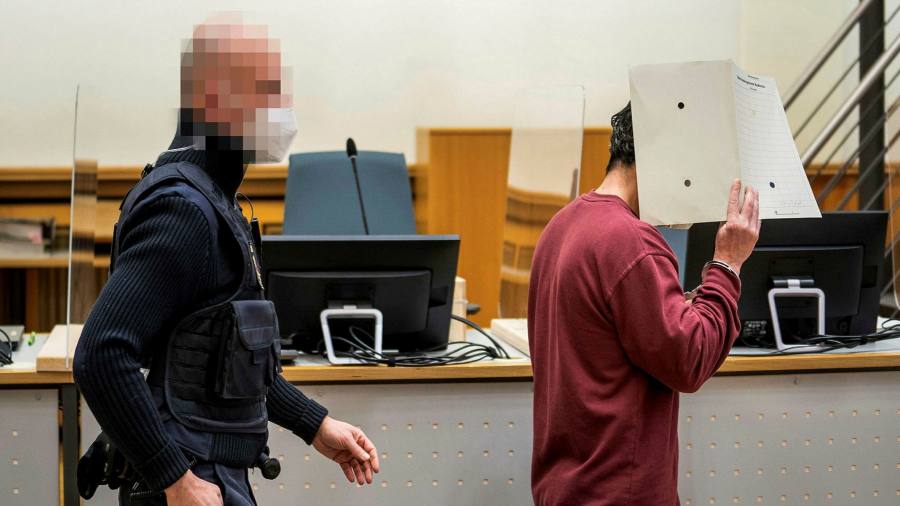[ad_1]
A German court made legal history on Wednesday by sentencing a Syrian man to four and a half years in prison, the first time a former member of Syrian intelligence has been convicted of a crime under international law.
Eyad A was tried on the basis of German laws that recognise universal jurisdiction for war crimes, crimes against humanity and genocide. Campaigners hope that principle can be applied to prosecute other, more senior figures in the Assad regime who have so far escaped justice.
The 44-year-old worked for Syria’s loathed General Intelligence Unit but later defected and fled the country. He was convicted by the higher regional court in the western German city of Koblenz of aiding and abetting a crime against humanity.
A, whose surname cannot be disclosed under German law, was specifically convicted for his role in rounding up 30 protesters in the autumn of 2011, during the early days of the Syrian uprising, and sending them to “Branch 251â€, a feared section of the General Intelligence Unit. The judge found him guilty of facilitating torture, given, as a security officer, he was likely to have known this would be the protesters’ fate.
“This is a historic moment for every Syrian and for the families of more than 130,000 people detained and disappeared,†said Wafa Mustafa, an activist and journalist based in Berlin, whose father was arrested in 2013 and has not been heard of since. “We should be witnessing Assad on trial at the International Criminal Court but this is the first step towards true accountability and justice.â€
The trial against A’s co-defendant Anwar R, a much more senior figure in Assad’s intelligence apparatus, is continuing, with a verdict not expected until October this year.
A colonel and head of investigations for Branch 251, R is charged with 4,000 counts of torture, rape and assault as well as 58 counts of murder, and his case is considered much more significant than A’s by those seeking to prosecute Syrian war crimes.
However, campaigners said A’s conviction was still an important precedent. “Today’s verdict is the first time a court has confirmed that the acts of the Syrian government and its collaborators are crimes against humanity,†said Patrick Kroker, who represents joint plaintiffs in Anwar R’s case.
“Hopefully this verdict will motivate other European prosecutors to initiate similar proceedings,†said Wolfgang Kaleck, general secretary of the European Center for Constitutional and Human Rights, which is supporting 29 torture survivors in the proceedings against Anwar R. “The goal must continue to be to bring high-ranking officials of Assad’s security apparatus to justice.â€
Pursuing justice for war crimes in Syria at the international level has long been problematic. In 2014, Russia and China blocked efforts at the UN Security Council to give the International Criminal Court a mandate over serious crimes in the country’s now decade-long civil war.
However in 2016, UN member states set up an international mechanism to gather and analyse evidence of war crimes for prosecution. This is expected to be critical to trials in Germany and elsewhere.
Some observers have raised moral objections to the prosecution of Eyad A, fearing it would deter other lower-ranking defectors from coming forward. He was interviewed by German investigators as a witness to regime crimes in 2018 and showed a willingness to co-operate in their probe. But because of his detailed knowledge of torture tactics, authorities later decided to reclassify him as a suspect. A argued in court that he was following orders and would have risked his own life if he had defied them.
[ad_2]
Source link





